How to remember foreign words
After studying nearly 10 languages (and currently speaking 6 of them) it took me a lot of trial and error to learn how to remember foreign words.
That’s because tere is a lot of confusion about the best way to learn vocabulary in a foreign language.
Apps? Memorizing?
Is immersion the only way? What if you can’t travel abroad?
Part of the problem is that many explanations online exist to sell you a product that claims to help you memorize vocabulary… but rarely does.
So that said, here are my favorite do’s and don’ts for how to learn foreign language vocabulary.
Ad-free.
DO understand there is no one best way to learn vocabulary in a foreign language.
One of the strongest tools a language learner has is their gut instinct (aka metacognition).
If you feel like what you’re doing now isn’t helping, you’re probably right.
No one knows your brain better than you do, so for the rest of this list, you’re going to put your instincts first. (Not what some random polyglot blogger says online.)
DON’T assume the first language app you hear about is the best.

Want to learn foreign languages? I make language memes on Instagram as @MultilingualMarissa
If your frustration is coming from Duolingo, I have good news:
It’s not you. It’s the bird.
I’ve personally found that the more fun or pretty-looking an app is, the lower functioning it may be.
Foreign language apps spend marketing money to make people use them and keep using them.
But the problem is that just because people use an app, doesn’t mean the app is working for them.
They often use apps just because they’re fun or even addicting.
You can really fall down the rabbit hole of research here, but here are some language apps I’ve used to varying levels of success. I’ve listed them in my personal favorite order, but remember that you need to trust your own gut here.
Traditional Foreign Language Vocabulary Apps
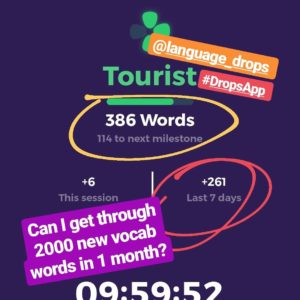
I tried Drops for 3 months straight, but it wasn’t one of my favorite for learning foreign vocabulary words.
- Anki (blank notecard app)
- uTalk (my fave, has the most languages out of all of them)
- Mango
- Lupa (Spanish only)
- Memrise
- Drops
If you haven’t heard of these before, don’t feel bad.
They can give your brain a real workout, so they’re not as easy-breezy to use as DuoLingo or Rosetta Stone. And because of that, they’re less addicting.
(I also review some resources on YouTube. Click here for the playlist.)
Vocabulary and Grammar Audio Courses
Outside of apps, there are also other vocabulary solutions available on your phone. I personally like audio courses (although many people hate them) and the ones I’ve enjoyed are:
- Michel Thomas (the best ones are when he himself is teaching them)
- Say Something In… (lower priced available in Welsh, Manx, and a few others)
- Language Transfer (free and available in German, Spanish, French, and other popular languages)
- Pimsleur (A bit old fashioned the slowest of them all, but nice for phrases or intimidated learners)
DO try, fail, and try again
Maybe apps aren’t for you.
Who knows: maybe you want to try journaling, writing by hand, or old-fashioned flash cards.
Maybe you just want to use songs.
Remember, you’re not just memorizing words but you’re learning how to learn at the same time.
Learning how to remember foreign words can be a chore, but learning a foreign language can be a joy.
If you want to learn the whole language, then you’ll have to improvise quite a lot and learn to fail gracefully.
And that means chucking things that aren’t working for you while you experiment with new things you’ve never tried before.
DO put some energy into memorizing foreign words
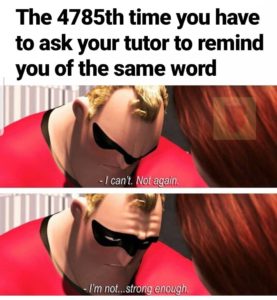 I’m sorry to say the m-word!
I’m sorry to say the m-word!
But a lot of the above-mentioned apps are games. And like I mentioned above, just because something is fun doesn’t mean it’s working (although I’ll talk more about fun later).
I personally use almost exclusively Anki and uTalk because memorization is a cornerstone to my vocabulary learning.
To memorize properly, you need to do it both from your native language into the foreign language, and back from the foreign language into your native language.
Unfortunately, if you only passively try to absorb new vocabulary, the words will be almost impossible to recall them later.
Here’s a great video I love about active recall and why it’s such a powerful strategy:
DON’T burn out on vocabulary flashcards
But at the end of the day, flashcards are a bummer!
No one wants to do them!
(Except for me, maybe.)
If you start to feel burnt out on flashcards or apps like Anki, here are a few strategies as to what you can do with the hardest foreign words left on your list:
- Writing prompts. Put all of the words on pieces of paper and crumple them up in a bowl or hat. Pick two at a time, and write a sentence using both words in the foreign language you’re trying to learn.
- Label your house. If the words pertain to objects in your house, use sticky notes to label the things with the words and say the word out loud every time you pass the note. Do this until you don’t have to look anymore.
- Use Wikipedia. Is it an abstract word? Search it on Wikipedia and read the article in the language you’re trying to learn. This way you’ll see it a bunch of times in use. After that, write yourself a one-paragraph summary. Admittedly this is better for advanced students, but I personally love this method. (You can even become a Wikipedia editor like me one day!)
DO foreign language immersion… at home.
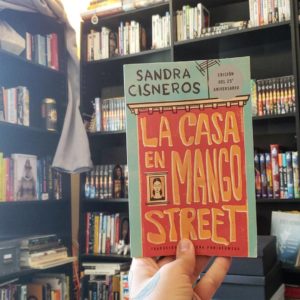 The more exposure you get to foreign words, the easier it will be to keep them in your head.
The more exposure you get to foreign words, the easier it will be to keep them in your head.
But what if you can’t afford to go to the place the language is spoken in?
I’ve done immersion for two of my languages, Portuguese and Catalan, without ever being to a region where each one was spoken!
Yup: I’ve never been to Portugal, Brazil, or Catalonia…. but through immersion, I learned their languages!
Here’s the secret.
I put aside days off to set up mini-immersion experiences for myself. And here’s how:
- Take in all of your morning news in that language! With YouTube and podcasts, including those made specifically for beginners like News in Slow, it’s easier to consume news in a foreign language than ever before.
- Read a book in the foreign language you’re studying. Even if you’re a beginner, there are tons of short story ebooks or audiobooks on Amazon. Remember: the more you’re exposed to foreign words, the easier it will be to remember them. My language resources lists have some recommended books at every level.
- Cook your lunch and dinner in foreign recipes. I do this all the time with Catalan! It’s also a way to make me feel closer to the language when I can’t go to where it’s spoken yet.
- Listen to music all day long in that language. YouTube channels like WordPie are an absolute dream, and largely how I learned all of my Spanish words when I had no idea how to learn vocabulary in a foreign language. It was a simple and fast solution!
- Leave comments on native speakers’ social media. I follow a ton of Instagram accounts in my target languages and try to even leave just a sentence here and there.
DON’T get frustrated when learning how to remember foreign words
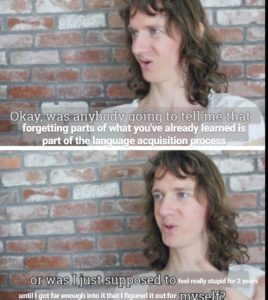
I wish that I had known forgetting new words was normal when I started learning languages!
It would have saved me a ton of frustration.
Here’s the thing: frustration is stressful, and stress leads to a reduced ability to learn. It’s that simple.
And we literally all forget words all of the time. Even in our native languages!
Here’s my 3 step method for busting stress while learning a language:
- Focus on my vision goal. I spend a lot of time daydreaming about using my French in Sugar Cabins in Quebec, having drinks in Rio, and going hiking in the Pyrenees. I’ve set vision goals with intention, using tools like my language Pinterest and journaling, so I always have something to fall back on when I’m frustrated.
- Do some fun learning. Especially with the languages where I can’t right now visit the place, I try to incorporate plenty of fun learning into my day: listening to podcasts especially for language learners, trying recipes in the language, and yes--even playing games on my phone.
- Go to sleep. When in doubt, sleep it out. Endless endless endless studies have shown that sleep is incredibly powerful for your memory and especially while learning languages. A little every day with a load of sleep will help you learn foreign vocabulary words much faster than if you try to cram them all in one day.
So what’s THE best way to learn foreign vocabulary words?
There isn’t one. But if you work through these steps, you’ll find a method that works well for you individually.
In the meantime, if you’re relearning a language, I invite you to check out our YouTube channel or subscribe to our email list.
Language learning can be a long and lonely road, but connecting with fellow learners is another way to help yourself stay optimistic and keep learning.
Have any other questions about how to remember foreign words? Leave them in the comments below so I can expand this article or answer you there!
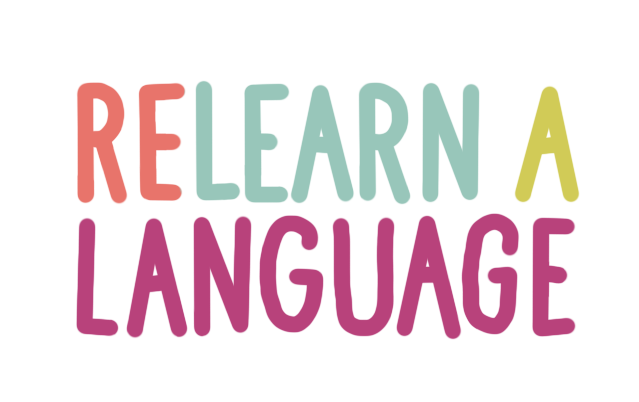
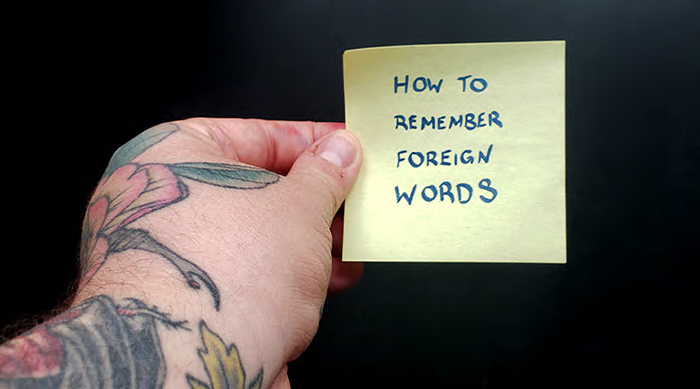
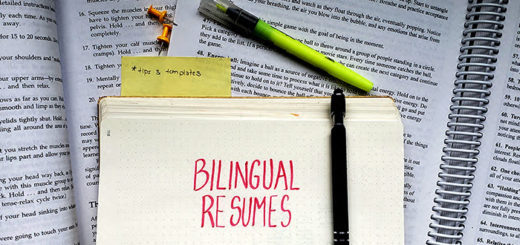

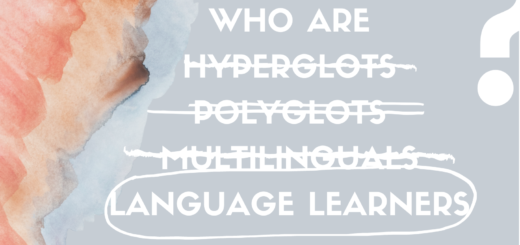

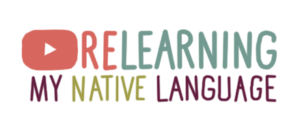
Would love to see your other resources (hard to find in Swahili), but there’s no link here:
“f you want to see more of my favorite language learning resources, click here.”
Hey! I just updated the link thanks 🙂 It was to some reviews I did on YouTube. For Swahili, the only ones I’m aware of that I really like are uTalki (mentioned in this article specifically for vocab) and Language Transfer (available for free for help with grammar and verbs). I believe the Instagram community of Swahili language learners is also pretty robust, so looking around at various hashtags over there might be a good start. Good luck!